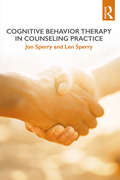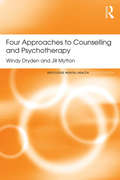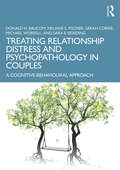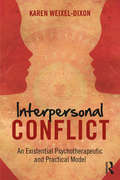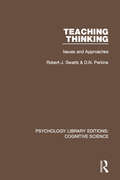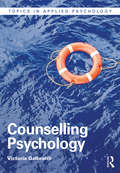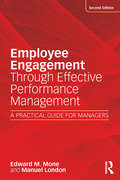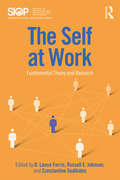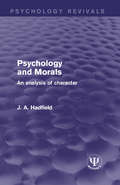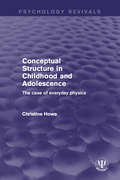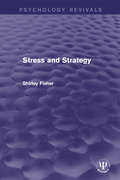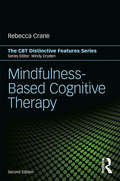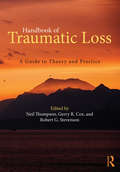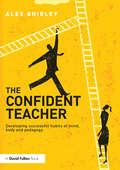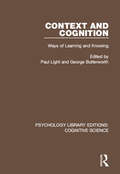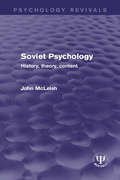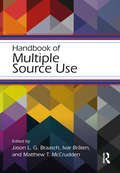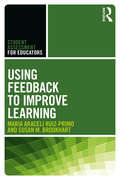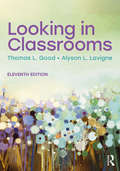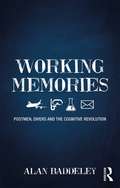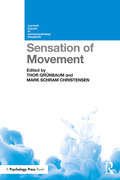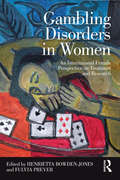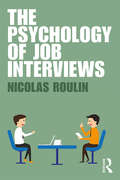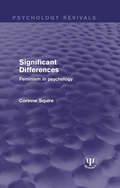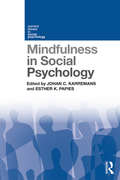- Table View
- List View
Cognitive Behavior Therapy in Counseling Practice
by Jon Sperry Len SperryThis Cognitive Behavior Therapy text is brief, practical, comprehensive, and tailored just for counselors. Evidence-based CBT techniques are specifically adapted to counseling including core-counseling concepts such as social justice, strengths, wellness, and diversity (e.g., ethnicity, culture, sexual orientation, gender, disability) which are interwoven throughout the book’s content. Each chapter includes case vignettes that reflect the work of professional counselors in school, clinical mental health, marital and family, and rehabilitation settings.
Four Approaches to Counselling and Psychotherapy (Routledge Mental Health Classic Editions)
by Windy Dryden Jill MyttonFour Approaches to Counselling and Psychotherapy provides an essential introduction to and overview of the main models of psychotherapy and counselling. With a new preface from Windy Dryden, this Classic Edition traces the development of counselling and psychotherapy, and examines the relationship between the two. The authors consider the four main models - psychodynamic, humanistic, integrative and cognitive-behavioural - before focusing on the most popular approach for each, including person-centred, rational emotive behavioural, and multimodal. Each approach is clearly examined in terms of its historical context and development, its main theoretical concepts and its aims. Written clearly and concisely, the book will have international appeal as an ideal introductory text for all those embarking on psychotherapy and counselling courses. It will also prove invaluable to students requiring a clear introduction to the subject.
Treating Relationship Distress and Psychopathology in Couples: A Cognitive-Behavioural Approach
by Donald H. Baucom Melanie S. Fischer Sarah Corrie Michael Worrell Sara E. BoedingClose relationships and mental health are two key ingredients to living a meaningful, fulfilled life. These two domains are the central focus of Treating Relationship Distress and Psychopathology in Couples: A Cognitive-Behavioural Approach. As expert clinicians, trainers, and researchers in the field of cognitive-behavioural couple therapy and couple-based interventions for psychopathology, the authors offer a highly accessible volume for experienced clinicians and trainees alike. This book details the most recent innovations in CBCT, a principle-based, flexible treatment approach for couples with a wide range of relationship concerns, circumstances, and stages of life. Based on a clear conceptual framework, readers learn how to address individual and couple functioning in an integrated, comprehensive manner and how to apply principle-based interventions that directly flow from this framework. Treating Relationship Distress and Psychopathology in Couples was written by a team of five authors, born in four different countries and working together as a team for a number of years, providing a cohesive framework based on work in a variety of contexts. While staying close to research findings that inform treatment, they provide a text for clinicians at all levels of training and experience in working with couples.
Interpersonal Conflict: An Existential Psychotherapeutic and Practical Model
by Karen Weixel DixonInterpersonal Conflict provides a psychotherapeutic and philosophical understanding of the nature of interpersonal conflict. Arguing that facilitating conflict resolution has little to do with objective logic or rationale, and everything to do with personal (and cultural) values and aspirations, Karen Weixel-Dixon uses the lens of existential psychotherapy to provide innovative skills for conflict management. The book offers a deeper understanding of those theories and practices surrounding currently held perspectives on conflict, and extends the repertoire of communication skills relevant to difficult interpersonal situations, offering theoretical and practical input into the possibilities of reaching a therapeutic result. Interpersonal Conflict will be an engaging and informative guide for professionals in psychotherapy, health, HR, legal and teaching professions working with conflict, as well as students taking courses involving conflict resolution.
Teaching Thinking: Issues and Approaches (Psychology Library Editions: Cognitive Science)
by Robert J. Swartz D.N. PerkinsOriginally published in 1990, this title attempts to provide for the educational practitioner an overview of a field that responded in the 1980s to a major educational agenda. This innovative ‘agenda’ called for teaching students in ways that dramatically improved the quality of their thinking. Its context is a variety of changes in education that brought the explicit teaching of thinking to the consciousness of more and more teachers and administrators.
Counselling Psychology (Topics in Applied Psychology)
by Victoria GalbraithThis is the first textbook to provide a complete overview of counselling psychology. Covering not only the underlying principles and philosophy of the profession, it offers a uniquely applied perspective in a concise, student-friendly format. From the relationship between research and practice to key ethical and professional issues, the book is written by some of the most eminent academic and practising psychologists in the field. It initially defines what counselling psychology and a therapeutic relationship involves, before outlining the range of approaches that can be taken with clients, from CBT to psychodynamic perspectives, and the journey of training through to working as a counselling psychologist. Supported by case studies and a range of features to illustrate how theory can be applied to practice, this is the ideal companion for courses in applied counselling psychology. The integrated and interactive approach covers the personal and professional issues which counselling psychologists face, making this the definitive introduction for any student of this growing field of study.
Employee Engagement Through Effective Performance Management: A Practical Guide for Managers
by Edward M Mone Manuel London Edward M. MoneThis book is a practical guide for managers to increase and support employee engagement through stronger performance management tools and techniques. In this second edition, Edward Mone and Manuel London incorporate new developments in the field, including discussion of issues about the value of challenging goals, annual formal appraisals, forced ranking, and ways to give constructive feedback. The authors expand the traditional notion of performance management to include building trust, creating conditions of empowerment, managing team learning, and maintaining ongoing straightforward communications about performance, all of which are critical to employee engagement. Case studies offer concrete examples, and checklists and surveys supply managers with ways to assess employee engagement as well as directions for increasing engagement. An up-to-date, straightforward guide, this book is appropriate for graduate students in Employee Engagement, Human Resources, and Management Studies, as well as scholars and practitioners in those fields.
The Self at Work: Fundamental Theory and Research (SIOP Organizational Frontiers Series)
by D. Lance Ferris Russell E. Johnson Constantine SedikidesThe Self at Work brings researchers in industrial and organizational psychology and organizational behavior together with researchers in social and personality psychology to explore how the self impacts the workplace. Covering topics such as self-efficacy, self-esteem, self-control, power, and identification, each chapter examines how research on the self informs and furthers understanding of organizational topics such as employee engagement, feedback-seeking, and leadership. With their combined expertise, the chapter authors consider how research on the self has influenced management research and practice (and vice-versa), limitations of applying social psychology research in the organizational realm, and future directions for organizational research on the self. This book is a valuable resource for researchers, graduate students, and professionals who are interested in how research on the self can inform industrial/organizational psychology.
Psychology and Morals: An Analysis of Character (Psychology Revivals)
by J. A. HadfieldOriginally published in 1923, this book had enjoyed constant and wide success, being reprinted fourteen times. In this new and thoroughly revised edition, published in 1964, the author has reconsidered his conclusions in the light of modern psychology of the time, and includes many case histories from his long experience as a psychiatrist. The book was important for its insistence that there is no intrinsic conflict between analytical psychotherapy and ordinary moral behaviour.
Conceptual Structure in Childhood and Adolescence: The Case of Everyday Physics (Psychology Revivals)
by Christine Howe‘Heat breaks up charcoal and puts sulphur dioxide in’; ‘The air pulls faster on heavy masses.’ These and other similar statements by school-aged children untutored in physics carry two messages. First, children’s pre-instructional conceptions of the physical world are a far cry from the received wisdom of science; second, despite their lack of orthodoxy, children’s conceptions carry a definite sense of causal mechanism. This sense of mechanism is the focal concern of this book, originally published in 1998, for it raises issues of central importance to both psychological theory and educational practice. In particular, some psychologists have claimed that human cognition is organised around causal mechanisms along the lines of a theory. This carries specific implications for teaching. Does the existence in children’s thinking of causal mechanisms relating to the physical world support these psychologists? Does this have consequences for the teaching of science? Christine Howe reviews evidence relating to pre-instructional conceptions in three broad topic areas: heat and temperature; force and motion; floating and sinking. A wide range of published work is discussed, including the author’s own research. In addition, a new study covering all three topic areas is reported for the first time. The message is that causal mechanisms can indeed play an organising role, that untutored cognition can in other words be genuinely theoretical. However, this tendency is highly domain-specific, occurring in some topic areas but not in others. Having drawn these conclusions, Christine Howe discusses their meaning in terms of both cognitive development and educational practice. A model is outlined which synthesises Piagetian action-groundedness with Vygotskyan cultural-symbolism and has a distinctive message for classrooms. This title will be useful to cognitive and developmental psychologists and to science educators alike.
Stress and Strategy (Psychology Revivals)
by Shirley FisherOriginally published in 1987, this title is concerned with the association between stress and control, and the implications for strategic response. It aims both to provide an up-to-date, comprehensive account of research in the area of stress for the advanced student and to develop a new synthesis of ideas leading to a cognitive model of stress and illness. The book reflects the idea that responses to stressful conditions are likely to be strategic, designed in order to achieve control in different ways. Concepts such as responsibility, instrumentality and predictability are discussed in an attempt to make the relationship between stress and control explicit. Different forms of the exercise of control are identified as features of strategy. A cognitive model of illness is developed, which assumes that the characteristics of strategies specified in terms of modes of control determine the features of ‘arousal pathology’ via hormone routes and thus influence the risk of illness. This differs from existing models at the time, which emphasise environmental properties such as incongruence, status inconsistency or ‘rule breakdown’ as determinants. A ‘constrained resource’ approach is emphasised, in which cognitive style and particular experiences exercise constraint on the range of strategies available in cognition. Hence these factors influence the risk of different kinds of ill health when life stresses are encountered. The book provides details of evidence and theory as well as new ideas and models. It will still be of interest to students of psychology, social science and medicine, who are concerned with stress and its relationship with human and health efficiency.
Mindfulness-Based Cognitive Therapy: Distinctive Features (CBT Distinctive Features)
by Rebecca CraneThis new edition of Mindfulness-Based Cognitive Therapy: Distinctive Features (MBCT) provides a concise, straightforward overview of MBCT, fully updated to include recent developments. The training process underpinning MBCT is based on mindfulness meditation practice and invites a new orientation towards internal experience as it arises - one that is characterised by acceptance and compassion. The approach supports a recognition that even though difficulty is an intrinsic part of life, it is possible to work with it in new ways. The book provides a basis for understanding the key theoretical and practical features of MBCT and retains its accessible and easy-to-use format that made the first edition so popular, with 30 distinctive features that characterise the approach. Mindfulness-Based Cognitive Therapy: Distinctive Features will be essential reading for professionals and trainees in the field. It is an appealing read for both experienced practitioners and newcomers with an interest in MBCT.
Handbook of Traumatic Loss: A Guide to Theory and Practice
by Neil Thompson Gerry R. Cox Robert G. StevensonThe Handbook of Traumatic Loss adopts a broad, holistic approach that recognizes traumatic loss much more fully as a multidimensional human phenomenon, not simply a medical condition. Initial chapters build a foundation for understanding traumatic loss and explore the many ways we respond to trauma. Later chapters counterbalance the individualistic focus of dominant approaches to traumatic loss by highlighting a number of thought-provoking social dimensions of traumatic loss. Each chapter emphasizes different aspects of traumatic loss and argues for ways in which clinicians can help deal with its many and varied impacts.
The Confident Teacher: Developing successful habits of mind, body and pedagogy
by Alex QuigleyThe Confident Teacher offers a practical, step-by-step guide to developing the habits, characteristics and pedagogy that will enable you to do the best job possible. It unveils the tacit knowledge of great teachers and combines it with respected research and popular psychology. Covering topics such as organisation, using your body language effectively, combatting stress, managing student behaviour, questioning and feedback, and developing confident students, it shows how you can build the confidence and skill to flourish in the classroom. This book will be an essential resource for all qualified and trainee teachers wanting to reach their full potential in this challenging but rewarding profession.
Context and Cognition: Ways of Learning and Knowing (Psychology Library Editions: Cognitive Science)
by George Butterworth Paul LightOriginally published in 1993, the study of cognitive development in children had moved from a focus on the intellectual processes of the individual studied in relative isolation, as in the classic work of Piaget, to a concern in the 1970s and 1980s with social cognition characterized by Vygotsky's views. In the years following, the trend toward an understanding of the situated nature of cognition had evolved even further and the extent to which thinking and knowing are inextricably linked to contextual constraints was at last being defined. Experts of international repute, the authors of this important book examine the recent literature on situated cognition in children. They explain contextual sensitivity in relation to ecological theories of cognition, and contrast intuitive reasoning in mathematical and other scientific domains with the failure of such reasoning in formal school contexts. Centrally concerned with the question of generalizability and transfer of knowledge from one situation to another, the contributors point to practical implications for understanding how intellectual competence can be made to generalize between "informal" and "formal" situations.
Soviet Psychology: History, Theory, Content (Psychology Revivals)
by John McLeishOriginally published in 1975, this title sets out to show us the differences between Soviet and other ways of thinking about nature, man, and society. The basic factor distinguishing Soviet psychology is that it views phenomena from the perspective of a highly articulated body of theoretical assumptions, and rejects the inductive ‘eclecticism’ of Western psychology. The theoretical framework within which Soviet psychology functions is the product of a distinctive socio-political and cultural development in Russia profoundly shaped by the institutions of autocracy and Orthodox religion, and the economic system of serfdom, and the radical revolt which grew up in opposition to this and advocated materialism, secularism, and atheism. This radical philosophic tradition in Russia, best represented by the writings of Chernishevski, fused with the doctrines of Marxism and the new science of behaviour developed by Sechenov and Pavlov to create the theoretical framework of Soviet psychology. The book also analyses the discussions, controversies, and decrees which are at the root of the contemporary science of behaviour in the Soviet Union, and points to the impressive body of empirical knowledge which has arisen. Soviet Psychology is unique in presenting Soviet psychology from an ‘inside’ point of view, and in making us appreciate the strongly theoretical stance of Soviet psychology which Professor McLeish claims is unlikely to be much influenced by the new atmosphere of détente.
Handbook of Multiple Source Use (Educational Psychology Handbook)
by Jason L.G. Braasch Ivar Bråten Matthew T. McCruddenThe Handbook of Multiple Source Use draws on theory and research within cognitive and educational psychology, the learning sciences, disciplinary education, information literacy, reading psychology, and social psychology, to present the first comprehensive research volume on this topic. Many learners both in and out of school have almost instantaneous access to an enormous range of information sources at present. In this book, broken into six sections, international scholars come together toward understanding factors that influence how individuals cope with the challenge of building knowledge from diverse, often conflicting, information.
Using Feedback to Improve Learning (Student Assessment for Educators)
by Maria Araceli Ruiz-Primo Susan M. BrookhartDespite feedback‘s demonstratively positive effects on student performance, research on the specific components of successful feedback practice is in short supply. In Using Feedback to Improve Learning, Ruiz-Primo and Brookhart offer critical characteristics of feedback strategies to affirm classroom feedback’s positive effect on student learning. The book provides pre- and in-service teachers as well as educational researchers with empirically supported techniques for using feedback as a part of formative assessment in the classroom.
Looking in Classrooms (Eleventh Edition)
by Thomas L. Good Alyson L. Lavigne<p>Looking in Classrooms uses educational, psychological, and social science theories and classroom-based research to teach future classroom teachers about the complexities and demands of classroom instruction. While maintaining the core approach of the first ten editions, the book has been thoroughly revised and updated with new research-based content on teacher evaluation, self-assessment, and decision-making; special emphases on teaching students from diverse ethnic, cultural, class, and gender-identity contexts; and rich suggestions for integrating technology into classroom instruction. <p>Widely considered to be the most comprehensive and authoritative source available on effective, successful teaching, Looking in Classrooms synthesizes the knowledge base on student motivation, classroom management, teacher expectations, teacher effectiveness, adaptive instruction for individual learners, and informative observational techniques for enhancing teaching. It addresses key topics in classroom instruction in an accessible fashion, promoting easy intepretation and transfer to practice, and articulates the roles of teacher-centered pedagogy, student-centered instruction, and project-based learning in today‘s classroom. <p>Guided by durable historical knowledge as well as dynamic, emerging conceptions of teaching, this text is ideal for undergraduate teacher training programs and for masters-level courses for teachers, administrators, and superintendents.</p>
Working Memories: Postmen, Divers and the Cognitive Revolution
by Alan BaddeleyTechnological developments during the Second World War led to an approach that linked ideas from computer science to neuroscience, linguistics, philosophy and psychology, known today as the Cognitive Revolution. Leaving behind traditional behaviourist approaches popular at the time, psychology began to utilise artificial intelligence and computer science to develop testable theories and design groundbreaking new experiments. The Cognitive Revolution dramatically changed the way that psychological research and studies were conducted and proposed a new way of thinking about the mind. In Working Memories, Alan Baddeley, one of the world's leading authorities on Human Memory, draws on his own personal experience of this time, recounting the radical development of a pioneering science in parallel with his own transatlantic, vibrant and distinguished career. Detailing the excitement and sometimes frustration experienced in taking psychology into the world beyond the laboratory, Working Memories presents unique insights into the mind and psychological achievements of one of the most influential psychologists of our time.
Sensation of Movement (Current Issues in Consciousness Research)
by Mark Christensen Thor GrünbaumSensation of Movement explores the role of sensation in motor control, bodily self-recognition and sense of agency. The sensation of movement is dependent on a range of information received by the brain, from signalling in the peripheral sensory organs to the establishment of higher order goals. Through the integration of neuroscientific knowledge with psychological and philosophical perspectives, this book questions whether one type of information is more relevant for the ability to sense and control movement. Addressing conscious sensations of movement, experimental designs and measures, and the possible functions of proprioceptive and kinaesthetic information in motor control and bodily cognition, the book advocates the integration of neuroscientific knowledge and philosophical perspectives. With an awareness of the diverse ideas and theories from these distinct fields, the book brings together leading researchers to bridge these divides and lay the groundwork for future research. Of interest to both students and researchers of consciousness, Sensation of Movement will be essential reading for those researching motor control, multimodal perception, bodily self-recognition, and sense of agency. It aims to encourage the integration of multiple perspectives in order to arrive at new insights into how sensation of movement can be studied scientifically.
Gambling Disorders in Women: An International Female Perspective on Treatment and Research
by Henrietta Bowden-Jones Fulvia PreverThis book brings together an international selection of academics with expertise in problem gambling issues in women, with chapters reflecting ongoing work with female gamblers across the world in both group and individual settings. In choosing such a specific patient group, the authors aim to raise the profile of gambling disorders in women and also provide fellow professionals across the world with a shared understanding of evidence based treatment and recovery in problem gambling literature and research. Gambling Disorders in Women: An International Female Perspective on Treatment and Researchwill provide professionals working in addictions and policy-making with much-needed knowledge about a seriously under-represented area, and about which many professionals feel they would like to know more. The book will also highlight different international approaches to the provision of treatment for women in each country as well as the epidemiology of the illness.
The Psychology of Job Interviews
by Nicolas RoulinMost people, at some point in their lives, experience the stress of being interviewed for a job they want. Many also face the challenge of interviewing other people. But what does the science tell us about this unique social situation? What biases are involved, and how can we become aware of them? And how can job interviews be structured so that they are fair and effective? The Psychology of Job Interviews is the first book to provide an accessible and concise overview of what we know. Based on empirical research rather than second hand advice, it discusses the strategies and tactics that both applicants and interviewers can use to make their interviews more successful; from how to make a good first impression to how to decide which candidate is the best fit for the role. Illustrated with examples throughout, the book guides job applicants on how best to prepare for and perform in an interview, and provides managers with best-practice advice in selecting the right candidate. Debunking several popular myths along the way, this is essential reading for anyone interested in understanding what is really happening in a job interview, whichever side of the desk you are sitting.
Significant Differences: Feminism in Psychology (Psychology Revivals)
by Corinne SquireCurrent western feminism and psychology have a particularly close relationship, with feminism finding an increasingly important voice in psychology. In this clear introductory text, originally published in 1989, Corinne Squire examines what feminism and psychology mean to each other, concentrating on the different ways in which feminism is articulated in psychology. Each of the feminist ‘movements’ within psychology is explored, with clear and critical explanations of the ways in which they differ significantly from conventional psychology. Squire looks at the dominant, egalitarian form of feminist psychology, which tries to work within traditional psychology, and at the woman-centred feminist psychology, which has developed largely outside the conventional discipline, and analyses the limitations and advantages of these approaches. She goes on to look at more complex feminist attempts to deal with psychological concerns, and identifies feminist initiatives, throughout psychology and outside it, which manage to address psychological issues but refuse to respect the boundaries of mainstream psychology, forming instead helpful associations with other forms of knowledge in order to change the nature of psychological discourse.
Mindfulness in Social Psychology
by Esther K. Papies Johan C. KarremansScientific interest in mindfulness has expanded in recent years, but it has typically been approached from a clinical perspective. This volume brings recent mindfulness research to classic social psychology topics such as romantic relationships, prejudice, prosocial behavior, achievement, and self-control. Written by renowned scholars in social psychology, it combines a comprehensive research overview with an in-depth analysis of the processes through which mindfulness affects people’s daily life experiences. It provides theoretical and methodological guidance for researchers across disciplines and discusses fundamental processes in mindfulness, including its effect on emotion regulation, executive control, automatic and deliberative processing, and its relationship to self-construal and self-identity. This book will be of particular interest to upper-level students and researchers in social psychology, health psychology, and clinical psychology, as well as social work and psychology professionals.
